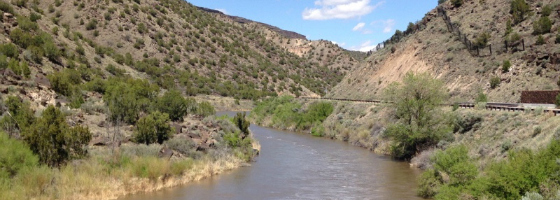Research

Research activities under the UNESCO Chair on Hydropolitics aim to reflect on political challenges related to water resources. Anchored in social sciences (political sciences, geography, economy), the Chair adopts an interdisciplinary approach, broadening the perspective to other disciplines as needed. Our research combines different theoretical and methodological approaches when analyzing institutional frameworks, policy processes, or conflict resolution mechanisms at multiple levels. The research program targets a great diversity of case studies.
Our research is organized in two ways. On the one hand, the Chair members develop different research proposals and projects based on international collaboration. These projects include:
- The Swiss Energy Transition and the Relationship with Europe(2018-2019), funded by the Swiss National Science Foundation (SNSF), in collaboration with the Swiss Federal Institute of Technology of Lausanne (EPFL), the Swiss Federal Institute of Aquatic Science and Technology (Eawag), and the University of Lausanne. The research consortium studies the impacts of the present and future EU energy policy on the Swiss energy strategy and, more specifically, on related relevant Swiss policy instruments and governance structures. This project holds potential for a subsequent study of the water sector in Switzerland and beyond.
- LIVES (Linked Indicators for Vital Ecosystem Services)(2013-2018), in partnership with WWF International and the Luc Hoffmann Institute. The LIVES project tests various ways of identifying ‘linked indicators’ for joint governance, planning and management of food, energy and water resources, to be used by institutions responsible for river basin management. The project questions how we combine ‘hard’ science with social science to provide useful and used knowledge. It aims for improved coherency in river basin planning so that risks are better identified and managed to benefit biodiversity and human well-being.
- Infragouv (Governance and durability of urban water network in Europe) (2017-2020), funded by the Swiss National Science Foundation (SNSF). Urban water supply and sanitation infrastructure in Europe is aging, and entering a phase of accelerated degradation. This deterioration directly impacts government authorities by threatening the quality of the public water supply and putting pressure on local budgetary balances. As such, recent reforms of urban water systems have been confronted by a complexity of governance processes. Therefore, the InfraGouv project aims to identify the governance conditions favorable to the optimal functioning of urban water infrastructure in Europe.
- EcoPolEau (Politic economy of water resources in Geneva: analysis of uses, services, costs, and financing modes)(2019-2021). The project aims to map water resources’ uses, the financial logic behind water policies, and their relationships. It will also show how the rules in force frame the practice of policy and its financing, as well as the coherence and socio-environmental sustainability associated with it.
- Monitoring for International Hydropolitical Tensions (Ongoing proposal), in collaboration with Oregon State University (OSU), Tufts University, and the International Union for the Conservation of Nature (IUCN). This project aims to combine different approaches, theoretical frameworks, and methodologies to monitor hydropolitical interactions and to identify critical variables that may play a role in the evolution of conflict and cooperation. In particular, the project explores the use of actors' discourses and practices as a source of information to detect triggers of conflict and cooperation over transboundary waters. The objective is to provide a new systematic, case study and discourse-based approach that complements ongoing global studies using large-N datasets to identify global trends in transboundary water governance, and that offers practical guidelines for the design and implementation of water diplomacy initiatives.
- Adaptation at Altitude: Taking Action in the Mountains(2020-2024), funded by Swiss Agency for Development and Cooperation (SDC), in collaboration with the Mountain Research Initiative (MRI), the Consorcio para el Desarrollo Sostenible de la Ecoregión Andina (CONDESAN), the International Centre for Integrated Mountain Development (ICIMOD), the United Nations Environment Programme (UNEP), Stockholm Environment Institute (SEI), and Zoï Environment Network. This collaborative programme aims to boost the resilience and adaptation of mountain communities in the face of climate change by focusing on four key areas: data, information and monitoring; regional science-policy exchange; knowledge generation and sharing; and policy mainstreaming.
- Dams: Water flows regulation in a fragmented world (2021-Ongoing). The initiative, jointly launched by the Geneva Water Hub and IUCN’s Environmental Law Centre, aims to contribute meaningfully to the current debate on dam’s management, and offer a set of resources to policymakers, researchers, and practitioners. The first step of this initiative is to elaborate an assessment of the legal tools applicable to dam planning, developing and monitoring. It will include a compendium of references grouping and analyzing the main frameworks and principles addressing the challenges of dams.
On the other hand, the Chair, as part of the Geneva Water Hub’s education and research activities, sets up its own research network, integrated into the existing UNESCO chairs. Such research network has materialized in:
- The coordination of the Universities’ Partnership for Water Cooperation and Diplomacy, a consortium of technical and policy expertise in water conflict prevention and resolution. The Partnership’s activities, coordinated by the Chair, focus on water issues from different perspectives and at multiple levels. The Partnership aims to achieve coordinated applied research, provide a platform for exchanging opportunities and information, and strengthen capacity building and training in water diplomacy.
- The collaboration in the Youth for the Rhine project, a youth-led applied research initiative. The project intends to encourage and motivate younger generations across the Rhine basin in addressing one of Europe’s prominent societal issues: climate adaptation and the diverse issues of water, energy, and food. This initiative, driven by the directorate-General for Public Works and Water Management “Rijkswaterstaat”, the Rhine Commission for Hydrology, and the Netherlands IHP-HWRP Committee, brings together different UNESCO Chairs.
